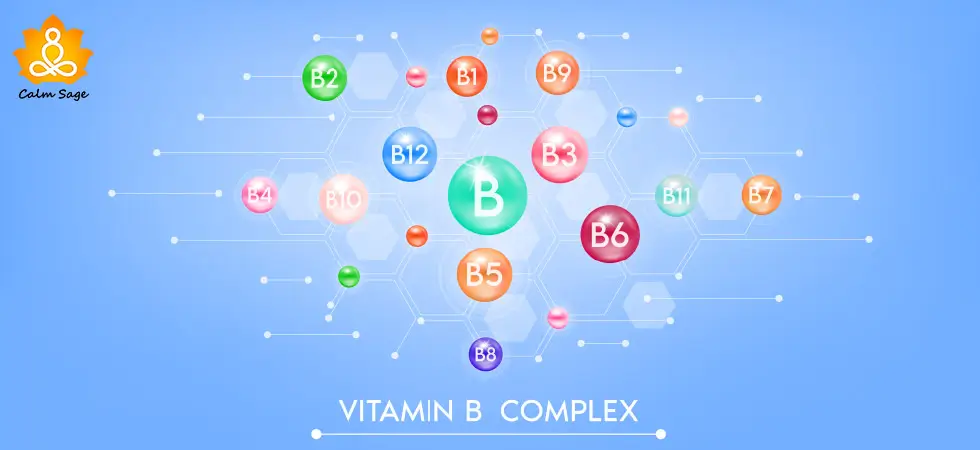Vitamin B Complex And Mental Health: Can Vitamin B Improve Mental Health?

Vitamin B complex tablets and sources are well known for their physical health effects. However, very few people know that complex doses of Vitamin B can also improve mental health. This also proves that deficiency of Vitamin B in the population could be a cause of increasing mental health issues. The vitamin B group is an essential group of micronutrients that is responsible for various functions in our body.
When we talk about the Vitamin B complex, we talk about eight types of Vitamin B which are gained through different sources of food. In this blog, we will understand how Vitamin B complex can improve mental health and how we can take Vitamin B daily in our meals.
What are B-complex vitamins?
B-complex vitamins contain 8 types of vitamin B found in different sources of food. B-complex supplements are also available in the market which contain all 8 types of Vitamin B in a pill. Vitamin B-complex are all water-soluble vitamins which means they are not stored by the body. This is why it is important to include Vitamin B in your regular diet.
The 8 types of Vitamin B ordered in the Vitamin B complex are:
1. Vitamin B1 (Thiamine): Vitamin B1 plays an important role in the overall functioning of our body. It generally metabolizes and converts nutrients into the required energy.
Sources of Thiamine: Sunflower seeds, wheat germ, pork
2. Vitamin B2 (Riboflavin): Vitamin B2 also helps food metabolize into energy. Riboflavin is also known for its antioxidant properties.
Sources of Riboflavin: Beef, mushrooms, organ meats
3. Vitamin B3 (Niacin): Vitamin B3 helps in metabolism, DNA production, repairs, and cellular signalling.
Sources of Niacin: Lentils, tuna, and chicken
4. Vitamin B5 (Pantothenic Acid): Vitamin B5 helps obtain energy from different groups of nutrients. It is also known for the production of cholesterol and hormones.
Sources of Pantothenic Acid: Fish, yogurt, avocado, liver
5. Vitamin B6 (Pyridoxine): Vitamin B6 is responsible for the metabolism of amino acids, the creation of neurotransmitters, and the production of red blood cells.
Sources of Pyridoxine: Potatoes, salmon, chickpeas
6. Vitamin B7 (Biotin): Biotin helps metabolize fats and carbohydrates. Additionally, biotin also regulates the expression of genes.
Sources of Biotin: Cheese, liver, salmon. Eggs, yeast
7. Vitamin B9 (Folate): Vitamin B9 helps in the growth of cells, the metabolism of amino acids, and the formation of white and red blood cells.
Sources of Folate: Leafy greens, beans, liver
8. Vitamin B12 (Cobalamin): Vitamin B12 is very important for the proper functioning of neurons, and it also helps red cell development and DNA production.
Sources of Cobalamin: Seafood, dairy, meats, eggs
Mental Health Benefits of Vitamin B Complex
People all around the globe struggle with nutritional deficiencies regularly. Vitamin B deficiency can be caused by vegetarianism, pregnancy, poor nutrition, alcoholism, and intake of certain medications. Vitamin B6 (Folate) and Vitamin B12 (Cobalamin) are one of the most affecting deficiencies around the globe.
Research shows that including Vitamin B in your regular meals or taking regular supplements can improve overall well-being. Below are some important mental health benefits of Vitamin B Complex:
- Reduces stress and increases mood levels: Vitamin B complex can help people fight fatigue and improve overall mood. Research shows that Vitamin B also helps in improving cognitive performance. Consuming Vitamin B complex regularly can improve negative mental health-related symptoms in 90 days, a study shows.
- Reduces symptoms of depression or anxiety: Vitamin B complex is not a complete cure for mental health disorders but the doses can really help initiate the recovery phase. Study shows that it can also help in reducing the symptoms of anxiety or depression. Additionally, the Vitamin B complex can also improve brain health.
- Improves brain health: Vitamin B12, B9, and B6 are well-known for improving brain health. Additionally, they can also help reduce the risks of dementia.
Symptoms of Vitamin B Deficiency
Due to a lack of proper knowledge, most people don’t know that they might be struggling with nutritional deficiencies which impact their overall wellbeing negatively. When a deficiency is left untreated, it worsens with time and leads to serious illnesses. Vitamin B deficiencies can lead to psychiatric, neurological, and physical symptoms.
For example, Vitamin B deficiency can impact cognitive and memory functioning. Below listed are some of the common signs of vitamin B deficiency:
- Severe mood changes
- Low energy
- Cognitive issues
- Tingling sensations
Answering the Most Asked Question: How much Vitamin B Complex should I Take?
According to Nutritionists, the recommended daily amount of Vitamin B complex usually depends on factors like age, sex, and others. For example, pregnant females need more doses of Vitamin B as compared to other people.
The below table can help you find the correct doses of Vitamin B Complex:
| Male | Female | |
| Vitamin B1 (Thiamine) | 1.2mg | 1.1mg |
| Vitamin B2 (Riboflavin) | 1.3mg | 1.1mg |
| Vitamin B3 (Niacin) | 16mg | 14mg |
| Vitamin B5 (Pantothenic Acid) | 5mg | 5mg |
| Vitamin B6 (Pyridoxine) | 1.3mg | 1.3mg |
| Vitamin B7 (Biotin) | 30mg | 30mg |
| Vitamin B9 (Folate) | 400mg | 400mg |
| Vitamin B12 (Cobalamin) | 2.4mg | 2.4mg |
How to Include Vitamin B in your Daily Diet Efficiently?
- Always take a Vitamin B complex supplement with Vitamin D3.
- Include more leafy greens, vegetables, fruits, and other fibrous sources for efficient results.
- Adopt a plant-based diet with complete and regular meals.
- Get sunlight every day to enhance the absorption
- Work on your blood levels
I hope this blog helps you understand the importance of taking Vitamin B complex for mental well-being. Comment down and share your queries through the same, we can’t wait to connect with you.
For more such content, connect with us through social media.
Thanks for reading!




















